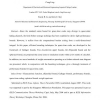Free Online Productivity Tools
i2Speak
i2Symbol
i2OCR
iTex2Img
iWeb2Print
iWeb2Shot
i2Type
iPdf2Split
iPdf2Merge
i2Bopomofo
i2Arabic
i2Style
i2Image
i2PDF
iLatex2Rtf
Sci2ools
TIT
2008
2008
Performance of Space-Time Codes: Gallager Bounds and Weight Enumeration
Since the standard union bound for space-time codes may diverge in quasi-static fading channels, the limit-before-average technique has been exploited to derive tight performance bounds. However, it suffers from the computational burden arising from a multi-dimensional integral. In this paper, efficient bounding techniques for space-time codes are developed in the framework of Gallager bounds. Two closed-form upper bounds, the ellipsoidal bound and the spherical bound, are proposed that come close to simulation results within a few tenths of a decibel. In addition, two novel methods of weight enumeration operating on a further reduced state diagram are presented, which, in conjunction with the bounding techniques, give a thorough treatment of performance bounds for space-time codes.
| Added | 15 Dec 2010 |
| Updated | 15 Dec 2010 |
| Type | Journal |
| Year | 2008 |
| Where | TIT |
| Authors | Cong Ling, Kwok H. Li, Alex ChiChung Kot |
Comments (0)

